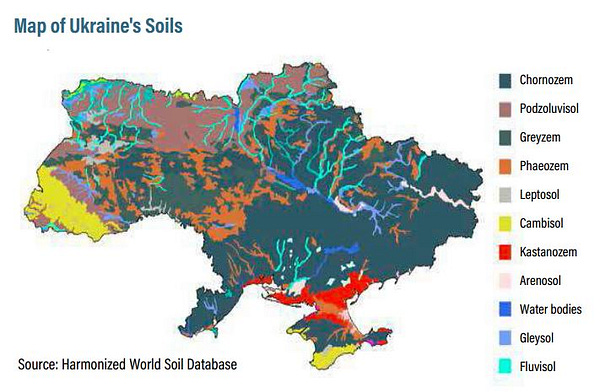With the continued low burn on the Eastern (Western?) Russo-Ukrainian front let's examine why this conflict matters to America and the rest of the world. Simple answer, grain, wheat, and petroleum. As I alluded to before in my article about the region's Energy Politics, these same commodities were relevant in the geopolitics of the Late Victorian Period, the Second World War, and the Cold War. History doesn't always repeat, but sometimes it rhymes.
About Democracy
The platitudes about Democratic government are primary motivators for some people. However, I discount that aspect given just how corrupt Ukraine is and how powers behave vis-à-vis the Ukrainian situation. This rhetoric around democracy is probably destructive, as I've pointed out in the past, and harmful to Ukrainian interests when it's a question of territorial sovereignty.
Also, there's an interesting question of what "democratic government" means to the world community. It's strange to think that unitary semi-presidential parliamentary governments are the model for the democratic government when the most powerful and most successful one in the world, the United States of America, is a federal system with republican characteristics. Would Ukraine benefit from a Federalized System? Possibly.
Ukraine's central government delegating more powers to the states could have reduced irredentism and separatism in Eastern Ukraine by the sizeable Russian minority. A common thread among Russians and Ukrainians is distinctiveness between the peoples. This distinction seems strange for the English-speaking world given the fundamental differences of the Britannic peoples on Albion herself, or a country like the United States where distinctiveness between different populations is far more pronounced. However, if there's a future Ukrainian government with the Russian minority in it, there needs to be adequate political representation; otherwise, this war repeatedly continues. I digress, however.
History of Energy Politics in Russia and Ukraine
The Late Victorian Period in Russia saw a tremendous expansion of petroleum products in the Russian sphere. So much so, this led to the Rockefellers expanding their oil empire overseas in search of market dominance. The Great Game was a competition for resources.
Fast forward to the Second World War, Ukraine and the Russian steppe was considered the breadbasket of Europe. During the early parts of the Second World War, the Atlantic blockade of Europe, destruction, and mismanagement of occupied Europe, the Axis-Occupied continent faced starvation. This shortage came as a new wave of typhus struck the continent, made more deadly by insufficient calories.
The Germans could do short-term reforms to improve agricultural production, but the food situation was subsistent and had weak oil production. The Germans had to invade the Soviet Union to solve their agriculture and oil problems. It solved the food problem briefly but failed to take the oil-producing Caucasus and Astrakhan. The Battles of Stalingrad (now Volgograd) and Kursk sealed the doom of Nazi Germany and an iron curtain set upon Europe.
The late 1970s saw an absolute spike in Oil Prices because of OPEC and other global economic conditions. Under Leonid Brezhnev, the Soviet Union saw nuclear parity with the West, significant efforts for détente (China's rise concerned Brezhnev), and stagnation. However, Soviet adventurism and national power were kept afloat by substantial prices in oil.
If Brezhnev was the high-water mark, the following leaders were the fall.
Simultaneously, while the Soviet Union faced stagnation because of Brezhnev's industrial policy of shifting production to heavy industrial goods instead of commercial goods, oil prices collapsed. Following the 1970s energy crisis, by 1980, oil producers raised production to meet global demand – however, The United States raised car fuel economy, and global demand collapsed. Subsequently, OPEC and other nations tried to cut production to keep prices high. Still, likely through covert diplomacy, Saudi Arabia broke with the rest of OPEC as a swing producer and began to produce oil at full production. In 1986, the price of oil collapsed to $10/barrel.
Grain and Energy Today
Russia today is still a petrostate. One of the reasons Russia punches so far above its weight compared to its GDP is that resource extraction is both direct hard power and easily convertible to currency. Another is that everything is extremely cheap in Russia by comparison. As a result, this country with tremendous intellectual human capital can confound European powers.
The other relevant commodities are soft commodities or grains.

In this grand chessboard, agricultural goods matter – and in the future, it will become increasingly relevant as the United States pivots to the challenge from China. As my former colleague from the Treasury, Tom Dans, explains, the major players involved in the Russo-Ukrainian are the major exporters of wheat and corn. Russian expansion would mean that it would become a more significant portion of global calorie consumption, giving it further market dominance.
Conflict in Ukraine, especially a very destructive one, would heavily impact energy prices globally and electricity in Europe and potentially harm food production. Ukraine is still the breadbasket of Europe all these decades later.




The most fertile soil in Ukraine is in the East, where the coal production is the highest, in the most Russian-speaking areas of Ukraine. Population is power in more than one way, and it matters who lives in the strategic locations of your country. Food and energy are power.
As a result of the commodity conflict, it's unlikely that status quo antebellum will satisfy Russia. There are far too many incentives to incorporate that region into Russia without considering the history of Russia and Ukraine. Furthermore, this is one of the significant reasons the Western powers are incentivized to obtain a peace that enforces the status quo antebellum. It maintains a balance of powers favorable to the United States and the United Kingdom alliance. China would prefer a disastrous diplomatic failure in Ukraine that allows Russia to become closer to China. Russia controls a tremendous amount of agricultural and energy production in its sphere. Peace must find a way for future peace.




